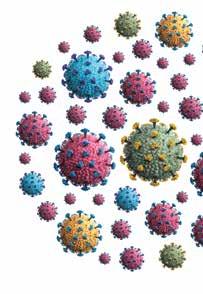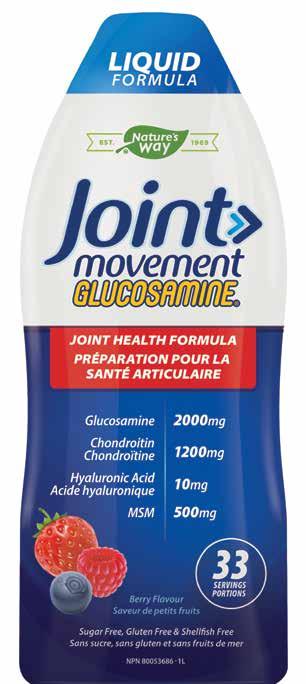
7 minute read
Immune guide
KEEPING YOUR
BALANCE
Advertisement
No matter how healthy you are, you are still going to catch the occasional bug.
Your immune system defends you from constant threats. Look after it so it can look after you.
BY STAFF

PART I
THE ABC’S OF IMMUNITY
We don’t realize it as we go about our day, but our immune system is engaged in a constant life-ordeath drama, fighting threats too small to see and winning most of them most of the time. In this era of the COVID-19 pandemic, it helps to get a bigpicture view of the immune system. Without it, we would all be sick, dying, or dead. In the article How the Immune System Works, in Medical News Today (2018), Tim Newman explains that “without an immune system, our bodies would be open to attack from bacteria, viruses, parasites, and more. It keeps us healthy as we drift through a sea of pathogens. This vast network of cells and tissues is constantly on the lookout for invaders.”
The immune system involves many types of cells, organs, proteins, and tissues. “Crucially, it can distinguish our tissue from foreign tissue — self from non-self. Dead and faulty cells are also recognized and cleared away by the immune system,” he says. If the immune system encounters a pathogen, a bacterium, virus, or parasite, it mounts a “socalled immune response.” Here’s the drill: White blood cells (also called leukocytes) “are on constant patrol. When they find a target, they begin to multiply and send signals out to other cell types to do the same.” Then the body attacks on several fronts. Leukocytes are stored in the thymus, spleen, bone marrow, and lymph nodes. They include: 1. phagocytes that surround and absorb pathogens and break them down; and 2. lymphocytes, which help the body to “remember” invaders and recognize them if they return to attack again. B lymphocytes secrete antibodies that lock onto antigens such as bacteria, fungi, virus, toxins, foreign bodies, or one of our own cells that is faulty or dead. Next, the B lymphocytes begin to secrete antibodies, special proteins that lock onto specific antigens. “Antibodies lock onto the antigen, but they do not kill it, only mark it for death,” says Newman. “The killing is the job of other cells, such as phagocytes.” Killer T cells (T lymphocytes) fight viruses. They recognize small parts of the virus on the outside of infected cells and destroy the infected cells. Once an antibody has been produced, a copy remains in the body to recognize the same antigen if it appears again.

TYPES OF IMMUNITY
There are three types of immunity in humans — innate, adaptive, and passive: Innate immunity Human immune systems, like those of many animals, attack foreign invaders immediately. These include the external barriers of our body, such as the skin and mucous membranes of the throat and gut. If the pathogen dodges the innate immune system, adaptive or acquired immunity kicks in. Adaptive (acquired) immunity This protection from pathogens develops as we are exposed to diseases or get vaccinated, building up a library of antibodies to different pathogens. Passive immunity This type of immunity is “borrowed” from another source. For instance, a baby receives antibodies from the mother through the placenta before birth and in breast milk following birth. This immunity protects the baby from some infections during the early years of their life. Immunizations Immunization introduces antigens or weakened pathogens to a person in such a way that the individual does not become sick but still produces antibodies. Because the body saves copies of the antibodies, it is protected if the threat should reappear later in life.
IMMUNE SYSTEM DISORDERS
Immunodeficiencies These arise when parts of the immune system do not function. For example, they can be caused by age, obesity, or alcoholism. In developing countries, malnutrition is a common cause. AIDS is an example of an acquired immunodeficiency. Some immunodeficiencies can be inherited.
Autoimmunity In this case, the immune system targets healthy cells, rather than foreign pathogens or faulty cells. Autoimmune diseases include celiac disease, type 1 diabetes, rheumatoid arthritis, and Graves’ disease. Hypersensitivity Here, the immune system overreacts and damages healthy tissue. An example is anaphylactic shock where the body responds to an allergen so strongly that it can be life-threatening. With so many complex roles in the human body, the immune system is a masterpiece of efficiency. Respect yours and treat it with the respect it deserves. SUPPORT THE UPSIDE

Note: the article in Medical News Today was reviewed by Daniel Murrell, M.D.
PART II
KEYS TO SUPPORTING YOUR IMMUNE SYSTEM
“On the whole, your immune system does a remarkable job of defending you against diseasecausing microorganisms. But sometimes it fails: A germ invades successfully and makes you sick. Is it possible to intervene in this process and boost your immune system?” Yes, according to the article “How to boost your immune system” by Harvard Health Publishing, February 15, 2021. But it’s a complex subject. Researchers are exploring the effects of diet, exercise, age, psychological stress, and other factors on the immune response, both in animals and in humans.
In the meantime, general healthy-living strategies make sense since they likely help immune function and they come with other proven health benefits. A healthy immune system can defeat invading pathogens.
Your first line of defense is to choose a healthy lifestyle. Following general good-health guidelines is the single best step you can take toward naturally keeping your immune system working properly. Every part of your body, including your immune system, functions better when protected from environmental assaults and bolstered by healthy-living strategies such as these:
s Don’t smoke.
s
s
s
s
s Eat a diet high in fruits and vegetables. Exercise regularly. Maintain a healthy weight. If you drink alcohol, drink only in moderation. Get adequate sleep.

STRESS AND IMMUNE FUNCTION
A healthy lifestyle is the best defence.
Take steps to avoid infection, such as washing your hands frequently and cooking meats thoroughly. Try to minimize stress. Keep current with all recommended vaccines. Vaccines prime your immune system to fight off infections before they take hold in your body.
MINIMIZE THE DOWNSIDE
With age, the immune response becomes reduced, which in turn contributes to more infections and more cancer. Respiratory infections, including influenza, the COVID-19 virus and pneumonia are a leading cause of death in people over 65 worldwide.
A form of malnutrition that is surprisingly common among older people is known as “micronutrient malnutrition,” in which a person is deficient in some essential vitamins and trace minerals that are obtained from or supplemented by diet. Some micronutrient deficiencies — for example, deficiencies of zinc, selenium, iron, copper, folic acid, and vitamins A, B6, C, and E — may alter immune responses in animals, as measured in the test tube. However, the impact of these immune system changes is less clear, as is the effect of similar deficiencies on the human immune response. If you suspect your diet is not providing you with all your micronutrient needs, taking a daily multivitamin and mineral supplement may bring other health benefits. Taking megadoses of a single vitamin does not.
Modern medicine has come to appreciate the closely linked relationship of mind and body. A wide variety of maladies, including stomach upset, hives, and even heart disease, are linked to the effects of emotional stress. Despite the challenges, scientists are actively studying the relationship between stress and immune function.
Most scientists try to study more constant and frequent stressors known as chronic stress, such as that caused by relationships, or sustained challenges to perform well at work. Some scientists are investigating whether ongoing stress takes a toll on the immune system. Regular exercise is one of the pillars of healthy living. It improves cardiovascular health, lowers blood pressure, helps control body weight, and protects against a variety of diseases. But does it help to boost your immune system naturally and keep it healthy? Just like a healthy diet, exercise can contribute to general good health and therefore to a healthy immune system.













